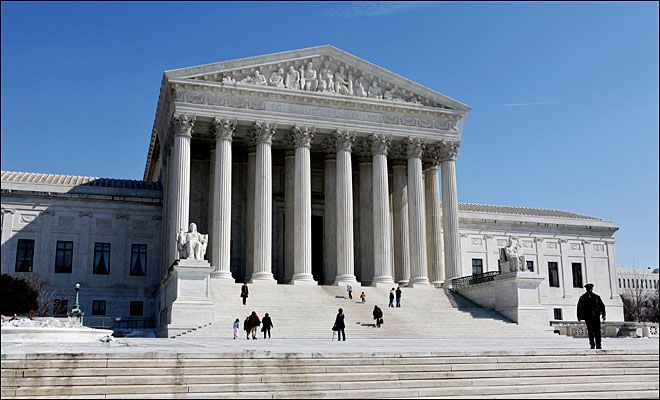This week we are watching for news out of the Supreme Court.

UPDATE 2: Emergency Stay Granted to Stop Implementation of Wisconsin Voter ID
… the basis was the Purcell objection, the proximity to the upcoming election and the risk of electoral chaos.
PDF of order (“Justices” Alito, Scalia, and Thomas dissented) is here:
the Seventh Circuit’s stay of the district court’s permanent injunction is vacated
Texas: A federal district court struck down the Texas Voter Id Law. The ruling issued an injunction, Texas said that they will appeal, so now we watch again.
UPDATE: 4th Circuit overturned by SCOTUS, extended registration in NC cancelled
… the full slate of changes passed by North Carolina this year, increasing restrictions on the voting process, is now back in effect for the election.
Justices Ginsberg and Sotomayor dissented (PDF) noting that the courts removal of pre-clearance in the VRA led directly to this outcome:
These measures likely would not have survived federal pre-clearance. The Court of Appeals determined that at least two of the measures – elimination of same-day registration and termination of out-of-precinct voting – risked significantly reducing opportunities for black voters to exercise the franchise in violation of §2 of the Voting Rights Act.
There are two important election related emergency requests that are pending. One is for North Carolina and is in the hands of Chief Justice Roberts. The other is for Wisconsin and is in the hands of Justice Kagan. Both matters have been fully briefed. Court watchers expect the North Carolina ruling to go in favor of the state and the Wisconsin ruling to go in favor of the voters. But tea leaf readers are really just guessing because as they say, the law is an ass, and the Supreme Court does whatever the heck it wants.
More below …
Rick Hasen at ElectionLawBlog.org wonders why the North Carolina ruling was not issued since Roberts had asked for briefs to be filed by Sunday at 5pm, suggesting some urgency:
So why the delay?
There is no way to know from the outside, but here are some possibilities, beginning with the most likely.
1. Someone is dissenting, or at least writing something to explain the decision. In the Ohio case, issued last week, the vote was 5-4 but there was no explanation from either the (conservative) majority or the (liberal) dissenters. Someone may want to say something here, either objecting to or explaining what the Court is doing.
2. The Court decided it wants more information and decided to wait. Today the trial court held a status hearing in the case and, according to a just-filed letter from NC challengers, the state said it would be easy to implement the 4th Circuit’s order. The challengers promise a transcript and no doubt NC will object to this characterization.
3. The Court wants to decide the North Carolina and Wisconsin case together, or perhaps a dissenter wants to reference a potential inconsistent treatment of the Purcell delay issue in the two cases. That would mean waiting until the further briefing came in in the Wisconsin case.
~
When we last left the North Carolina ruling, the 4th Circuit had stopped two parts of the North Carolina law from going into effect: the elimination of a week of early voting and how ballots that are cast in the wrong precincts are to be handled. The state wanted to eliminate the early voting week because it also, because of existing election law, allowed people to register at the same time; it was called the Golden Week because it required only one visit to the polling place where you could register and vote. The second part that the appeals court stopped was the handling of ballots accidentally cast in the wrong precinct. The new law threw those out … the old law allowed them to be treated as provisional ballots and counted as long as the voter did not vote anywhere else.
In Wisconsin, we are waiting for a ruling on the voter id law which was put in place on September 12th based on new rules for obtaining ids that were rushed into place by the state on September 11th. There is no question that the lifting of the stay that had been in place on this law since 2012 – with such short notice – will disenfranchise voters. District Judge Adelman, in his initial ruling, estimated that 9% of Wisconsin voters lacked the proper id and wherewithal to get the proper id: about 300,000 voters. With the relaxation of the documentation needed to obtain a voter id, the number is estimated now to be somewhat less BUT – and this is a big BUT – 20% of Wisconsin voters do not realize that they need an id to vote. Note: the last governors election in 2010 was decided by about 60,000 votes and this years election is expected to be closer.
The Purcell test, in simple terms says that you cannot change rules for an election when it is so close to the date that it causes chaos and confusion. The only exception is if the state can show true harm (not just rightwing butthurtery) if the law is delayed.
In the case of Wisconsin, there have been no (as in ZERO) cases of voter fraud that an id would have stopped from occurring so delaying the voter id requirement until the Spring 2015 election causes no harm to the state*. And having to obtain a special voter id that can only be issued by the state’s Department of Motor Vehicles during normal business hours will cause some voters to be unable to cast a ballot. Period.
*Wisconsin Attorney General J.B. Van Hollen plays Bad Analogy Theater when he says, in his response: “Wisconsin does not have to be robbed before it can lock its doors.”. No, but before you take away the most basic right of democracy, the right to vote, you have to base it on more than fear that something that has never happened COULD happen. Republicans are famous for saying that we should enforce the laws on the books before we make new laws; there are Wisconsin laws that make voter fraud a felony and that should be enough to keep the people from voting illegally … and robbers out of AG Van Hollen’s living room.
I hope that Justice Kagan rolls her eyes at this flimsy construct.

Editor’s Note: Feel free to share other news stories in the comments.
14 comments